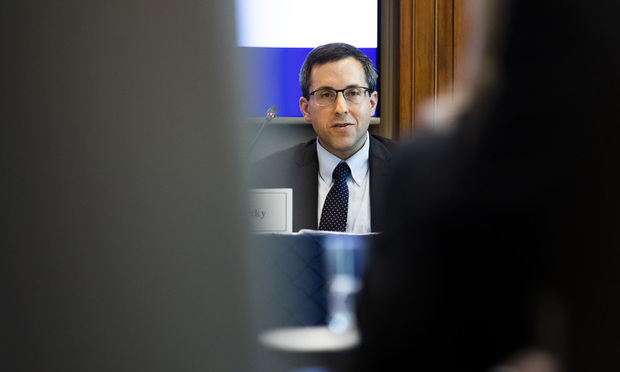Prior Salary Can Justify Gender Pay Differences, US Supreme Court Is Told
"There should be one, uniform answer to the important question whether the Equal Pay Act permits employers to base wages on prior pay," lawyers from Jones Day, representing the Fresno County superintendent of schools, asserted in a new petition at the U.S. Supreme Court.
March 27, 2020 at 10:00 PM
5 minute read
 Jones Day offices in Washington, D.C. Photo: Diego M. Radzinschi/ALM
Jones Day offices in Washington, D.C. Photo: Diego M. Radzinschi/ALM
Employers can lawfully use prior salary considerations to defend paying male and female workers differently for the same work, lawyers from Jones Day asserted in a new petition at the U.S. Supreme Court testing the scope of the federal Equal Pay Act.
The petition, docketed Friday in the case Fresno County Superintendent of Schools v. Rizo, challenges a ruling by the en banc U.S. Court of Appeals for the Ninth Circuit. The divided appeals court in February said employers cannot rely on prior salary to justify gender disparities for employees performing the same work.
The trip to the Supreme Court marks the second time the case has arrived there, but the justices last year declined to reach the merits of the dispute. The high court concluded then that the vote of a Ninth Circuit judge who died after the first ruling was issued should not have counted. The Ninth Circuit reconsidered the case, and Fresno County still lost.
Fresno County's Jones Day team, led by appellate partner Shay Dvoretzky in Washington, contend the federal appeals courts are sharply divided over whether and when employers can consider an applicant's prior salary in setting compensation. They also argued that an applicant's prior salary is a permissible "factor other than sex"—as described by federal law—that can justify differences in pay between male and female employees performing the same work.
"There should be one, uniform answer to the important question whether the Equal Pay Act permits employers to base wages on prior pay. Because there is not, and because the Equal Pay Act permits employers to consider prior salary, this Court should grant certiorari and reverse the decision below," Dvoretzky told the justices.
Writing for the Ninth Circuit majority, Judge Morgan Christen said the EPA was established to "eradicate the practice of paying women less simply because they are women." Christen continued: "Allowing employers to escape liability by relying on employees' prior pay would defeat the purpose of the act and perpetuate the very discrimination the EPA aims to eliminate."
Allowing employers to use prior salary to defend pay disparities "would frustrate the EPA's purpose as well as its language and structure by perpetuating sex-based wage disparities."
The case at the Supreme Court is expected to attract considerable attention from workers' advocates and business interests. Major U.S. law firms that advise on labor and employment matters issued advisories after the Ninth Circuit's ruling in February. Those client alerts noted that many states already prohibit employers from considering, and in some cases even asking about, an applicant's prior salary.
"Given the maze of federal, state, and local laws that govern the use of wage history, employers should evaluate the laws that apply to their operations to ensure they are not unwittingly running afoul of these potentially conflicting obligations," the management-side firm Seyfarth Shaw said in an advisory.
The Ninth Circuit majority said the EPA "does not prevent employers from considering prior pay for other purposes." The court stated: "For example, it is not unusual for employers and prospective employees to discuss prior pay in the course of negotiating job offers, and the EPA does not prohibit this practice. Certainly, our opinion does not prohibit this practice."
Jones Day's Dvoretzky, a leading Supreme Court lawyer, told the justices in Fresno County's petition that a recent survey of employers showed "two-thirds of employers allow interviewers to ask about prior salary where the law permits it." He disputed the Ninth Circuit's position that employers could discuss prior salary but not rely on it to base pay differences.
 Shay Dvoretzky, a partner with Jones Day, speaking at a U.S. Chamber of Commerce event June 21, 2019. Credit: Diego M. Radzinschi / NLJ
Shay Dvoretzky, a partner with Jones Day, speaking at a U.S. Chamber of Commerce event June 21, 2019. Credit: Diego M. Radzinschi / NLJDvoretzky called the Ninth Circuit's position "ridiculous," telling the justices: "Employers do not purposefully acquire—let alone discuss, and certainly not act upon—information that could later subject them to liability under federal employment law."
Daniel Siegel of Oakland's Siegel, Yee, Brunner & Mehta argued for Aileen Rizo, a math consultant, at the Ninth Circuit. Rizo claimed in her suit that Fresno County schools had paid her $10,000 less than male colleagues.
"Allowing an employer to consider prior salary along with other factors in setting an employee's initial salary might mitigate but does not eliminate the discriminatory impact of past employment practices," Siegel told the appeals court. "Even if prior salary is valued at just 10% or less in an employer's assessment of the various factors to be considered in setting a new employee's compensation, it still brings a discriminatory factor into the equation."
Siegel's response to Fresno County's petition is due in late April.
Read more:
Seeking Pay Equity? Management Diversity, Transparency Are Key
9th Circuit: Employers Can't Rely on Prior Pay to Justify Gender Disparities
Once Again, University of Texas Law Accused of Underpaying Women
This content has been archived. It is available through our partners, LexisNexis® and Bloomberg Law.
To view this content, please continue to their sites.
Not a Lexis Subscriber?
Subscribe Now
Not a Bloomberg Law Subscriber?
Subscribe Now
NOT FOR REPRINT
© 2025 ALM Global, LLC, All Rights Reserved. Request academic re-use from www.copyright.com. All other uses, submit a request to [email protected]. For more information visit Asset & Logo Licensing.
You Might Like
View All
Apple Files Appeal to DC Circuit Aiming to Intervene in Google Search Monopoly Case
3 minute read
DC Circuit Revives Firefighters' Religious Freedom Litigation in Facial Hair Policy Row
3 minute read
Judges Split Over Whether Indigent Prisoners Bringing Suit Must Each Pay Filing Fee

4th Circuit Upholds Virginia Law Restricting Online Court Records Access
3 minute readLaw Firms Mentioned
Trending Stories
- 1Uber Files RICO Suit Against Plaintiff-Side Firms Alleging Fraudulent Injury Claims
- 2The Law Firm Disrupted: Scrutinizing the Elephant More Than the Mouse
- 3Inherent Diminished Value Damages Unavailable to 3rd-Party Claimants, Court Says
- 4Pa. Defense Firm Sued by Client Over Ex-Eagles Player's $43.5M Med Mal Win
- 5Losses Mount at Morris Manning, but Departing Ex-Chair Stays Bullish About His Old Firm's Future
Who Got The Work
J. Brugh Lower of Gibbons has entered an appearance for industrial equipment supplier Devco Corporation in a pending trademark infringement lawsuit. The suit, accusing the defendant of selling knock-off Graco products, was filed Dec. 18 in New Jersey District Court by Rivkin Radler on behalf of Graco Inc. and Graco Minnesota. The case, assigned to U.S. District Judge Zahid N. Quraishi, is 3:24-cv-11294, Graco Inc. et al v. Devco Corporation.
Who Got The Work
Rebecca Maller-Stein and Kent A. Yalowitz of Arnold & Porter Kaye Scholer have entered their appearances for Hanaco Venture Capital and its executives, Lior Prosor and David Frankel, in a pending securities lawsuit. The action, filed on Dec. 24 in New York Southern District Court by Zell, Aron & Co. on behalf of Goldeneye Advisors, accuses the defendants of negligently and fraudulently managing the plaintiff's $1 million investment. The case, assigned to U.S. District Judge Vernon S. Broderick, is 1:24-cv-09918, Goldeneye Advisors, LLC v. Hanaco Venture Capital, Ltd. et al.
Who Got The Work
Attorneys from A&O Shearman has stepped in as defense counsel for Toronto-Dominion Bank and other defendants in a pending securities class action. The suit, filed Dec. 11 in New York Southern District Court by Bleichmar Fonti & Auld, accuses the defendants of concealing the bank's 'pervasive' deficiencies in regards to its compliance with the Bank Secrecy Act and the quality of its anti-money laundering controls. The case, assigned to U.S. District Judge Arun Subramanian, is 1:24-cv-09445, Gonzalez v. The Toronto-Dominion Bank et al.
Who Got The Work
Crown Castle International, a Pennsylvania company providing shared communications infrastructure, has turned to Luke D. Wolf of Gordon Rees Scully Mansukhani to fend off a pending breach-of-contract lawsuit. The court action, filed Nov. 25 in Michigan Eastern District Court by Hooper Hathaway PC on behalf of The Town Residences LLC, accuses Crown Castle of failing to transfer approximately $30,000 in utility payments from T-Mobile in breach of a roof-top lease and assignment agreement. The case, assigned to U.S. District Judge Susan K. Declercq, is 2:24-cv-13131, The Town Residences LLC v. T-Mobile US, Inc. et al.
Who Got The Work
Wilfred P. Coronato and Daniel M. Schwartz of McCarter & English have stepped in as defense counsel to Electrolux Home Products Inc. in a pending product liability lawsuit. The court action, filed Nov. 26 in New York Eastern District Court by Poulos Lopiccolo PC and Nagel Rice LLP on behalf of David Stern, alleges that the defendant's refrigerators’ drawers and shelving repeatedly break and fall apart within months after purchase. The case, assigned to U.S. District Judge Joan M. Azrack, is 2:24-cv-08204, Stern v. Electrolux Home Products, Inc.
Featured Firms
Law Offices of Gary Martin Hays & Associates, P.C.
(470) 294-1674
Law Offices of Mark E. Salomone
(857) 444-6468
Smith & Hassler
(713) 739-1250








